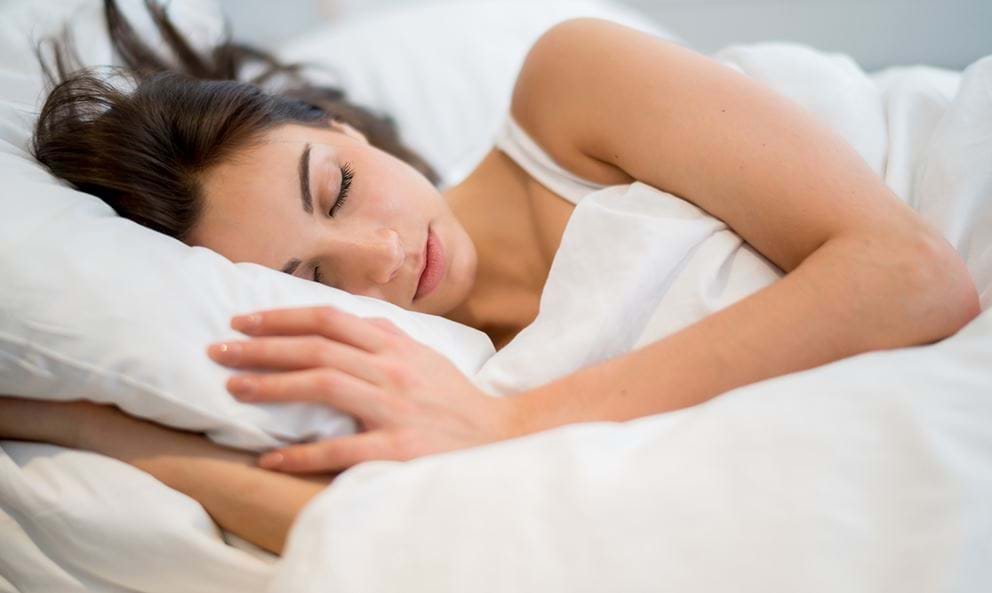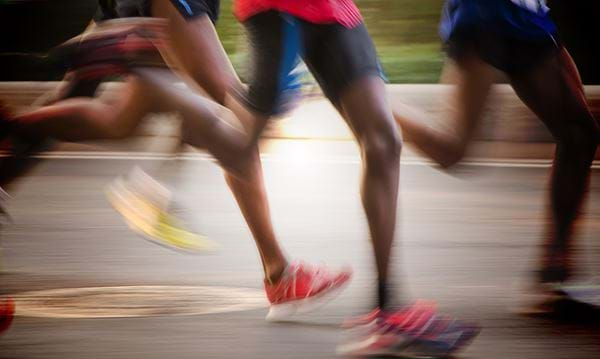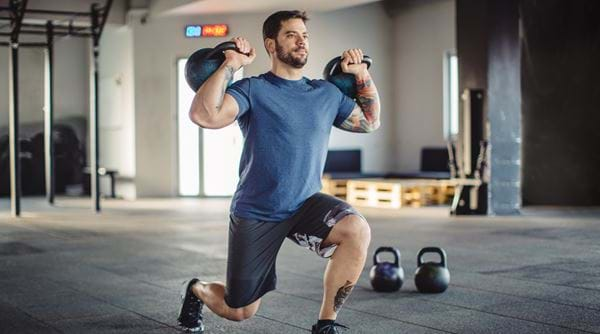Can the Gym Really Help Me Sleep Better?

Page last updated: 10th March 2022
Good sleep is essential for good health. Research has suggested that, among other things, sleep deprivation is linked to a greater likelihood of obesity[1], reduced athletic performance[2], and increased risk of heart disease[3] and stroke.
With so many people missing out on sleep altogether in order to keep up with work and social commitments, and as many others suffering from poor-quality sleep for the same reasons, the question of sleep is a major health issue of our time.
One sleep remedy that’s frequently recommended is going to the gym and getting more exercise. This article will be covering:
- How can exercising at the gym help me sleep better?
- How can getting more sleep improve my gym success?
- Other tips for getting a better night’s sleep
- How much sleep do I need?
How can exercising at the gym help me sleep better?
-
Aerobic exercise may improve sleep quality, vitality, reduce depression
In a 2010 study[4] by Northwestern Medicine, a group of people experiencing insomnia and sleep quality issues were administered aerobic exercise four times per week. The result was that the subjects moved from “poor sleepers” to “good sleepers” in a self-reported sleep quality survey.
The subjects in question also experienced less daytime sleepiness, less depressive symptoms, and a greater sense of vitality as a result of the exercise.
-
Exercise seems to reduce the severity of obstructive sleep apnoea
Obstructive sleep apnoea is a condition which causes a person to stop and start breathing, sporadically, throughout the night. This condition is marked by snoring and seriously diminished sleep quality. People with sleep apnoea frequently report feeling exhausted all day, even after having slept for a long time.
A 2014 meta-analysis[5] found evidence that exercise significantly reduced the effects of sleep apnoea, while also having positive effects on daytime sleepiness and (unsurprisingly) cardiorespiratory fitness.
-
Exercise may reduce the time it takes to fall asleep
A study[6] conducted in 2012 investigated subjects placed in an exercise group (doing either moderate intensity aerobics or HIIT) and found that exercise seemed to be linked to a significant reduction in sleep latency. In other words, the exercising subjects fell asleep significantly more quickly than they otherwise would have.
As trouble falling asleep in the first place is one of the major forms of insomnia, this is a significant finding.
-
Moderate-intensity aerobic exercise seems to reduce insomnia-associated anxiety
Insomnia isn’t a completely clear-cut issue, as an inability to fall asleep can be due to both physical and psychological factors, as well as the complex interplay between the two.
A 2010 study[7] found that moderate-intensity aerobic exercise, specifically, appeared to reduce pre-sleep anxiety associated with insomnia, and improve sleep quality in insomniac subjects.
So, there you have it. The case seems pretty clear cut – exercise can only do good for the length and quality of your sleep. If you’re struggling to nod off at night or are waking up without feeling rested, getting going with a proper exercise routine during the day could be the solution you’re looking for.
For workout ideas, check out our free workouts page.
How can getting more sleep improve my gym success?
So, we’ve shown how the gym can help you sleep better, but did you know that getting the right amount of sleep can also help your performance in the gym? Here’s how…
-
Sleep is when the body really recovers
Any type of exercise works by placing a strain on the body and inducing micro-injuries that will need to be repaired. If the repairs go according to plan, the body will come back stronger and more able to handle the strain the next time around.
Sleep seems to be the time when your body really kicks into recovery mode. Studies have found that a massive spike of Growth Hormone occurs during the nocturnal hours, but only when the subjects are properly asleep.
Whether you’re a runner or a weight lifter, the fact is that sleep is essential for recovery and progression. If you want to see through your efforts made in the gym are paying off, make sure to clock in enough time for your body to rest and recover from your training.
It’s not just sleep that you need to consider - it’s also important to take regular rest days so you’re not working out every single day. You can learn more about rest days and why they’re important here.
-
Poor sleep promotes fat gain
A 2009 review[8] of the scientific data noted that sleep deprivation is directly tied to increased levels of the hormone ghrelin (responsible for hunger), decreased levels of the hormone leptin (responsible for satiety), decreased insulin sensitivity (meaning fat is stored more easily), and more.
What this means at the end of the day, is that sleep deprivation creates a perfect storm of bad conditions which can lead to weight gain. For many of us, more hunger, combined with more fat storage, is not what we are after, so if your gym efforts are focused on weight loss, then it would be a good idea to make sure you're getting enough sleep.
-
Sleep deprivation means 'hitting the wall' faster
Research has found[9] that, although moderate sleep deprivation doesn’t appear to impact cardiovascular response or muscle strength directly, it does reduce the time it takes to experience exhaustion.
Additionally, perceived exertion is always higher in sleep-deprived individuals – meaning that regardless of your physical state, any exercise you do will feel much more difficult and uncomfortable.
The bottom line of all of this is that being sleep deprived means you’ll have less energy to get in a quality workout in or for a prolonged workout – which is especially bad for endurance athletes – and will also feel much worse about getting up, heading to the gym, and doing your workout in the first place.
Other tips for getting a better night's sleep
To help you reap all the positive benefits of getting a good night’s sleep, we asked Dr Sarah Hattam to provide tips you can start implementing into your lifestyle today.
-
Have a routine
Whether we are working from home or key workers on the frontline at the moment, having a good sleep routine will help to keep us productive. Set a sleep schedule based on your workday routine for a few weeks. If you want to, you can keep a sleep diary to track your progress and note how you're feeling (e.g. sleepy in the afternoons) and adjust the schedule accordingly.
-
Limit your caffeine and alcohol intake
Caffeine is a stimulant that can make you feel more alert, so try to limit your intake of caffeine such as coffee, tea and energy drinks, particularly later in the day. Although alcohol may help you fall asleep more quickly, it can affect the 'rest and relax' part of our nervous system which can lead to our 'stress switch' remaining "on", and in turn, disrupt our quality of sleep. Keep an eye on your intake or avoid reaching for a tipple in the evening.
-
Make time to unwind
A busy brain isn't conducive to a good night's sleep. A predictable bedtime routine, such as a warm bath, milky drink and reading a book, can help your mind relax.
-
Avoid blue light close to your bedtime
The Sleep Council UK suggest we stop using electronics an hour before bedtime due to the blue light emitted which can interfere with the release of our sleepy hormone, melatonin. You can choose to keep your phone in a separate room to help you break the habit.
-
Set the scene
Dimming the lights an hour before sleep will release your body’s sleepy hormone, and gentle rhythmical sounds such as those on the Windy or Calm apps can help entice you to sleep.
-
Sleep in a cool environment
One of the cues for our bodies that it’s sleepy time is a drop in body temperature, so keep your room cooler than the rest of the house and avoid overheating the bed with hot water bottles and electric blankets.
How much sleep do I need?
This will vary from person to person. Most people need around 8 hours. A Sleep Council Survey found that the majority of UK adults get by on seven hours or less, with a third surviving on just five to six hours per night so most of us could probably do with getting more sleep.
Ready to reap all the benefits of heading to the gym? Find a PureGym near you and become a member today.
[1] https://www.ncbi.nlm.nih.gov/pmc/articles/PMC2398753/
[2] https://www.ncbi.nlm.nih.gov/pubmed/21731144
[3] https://www.ncbi.nlm.nih.gov/pubmed/21300732
[4] https://www.northwestern.edu/newscenter/stories/2010/09/aerobic-exercise-relieves-insomnia.html
[5] https://www.ncbi.nlm.nih.gov/pmc/articles/PMC4216726/
[6] https://www.ncbi.nlm.nih.gov/pubmed/22884182/
[7] https://www.ncbi.nlm.nih.gov/pmc/articles/PMC2883039/
[8] https://www.ncbi.nlm.nih.gov/pmc/articles/PMC4444051/
[9] http://www.nhs.uk/Livewell/tiredness-and-fatigue/Pages/lack-of-sleep-health-risks.aspx


